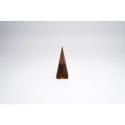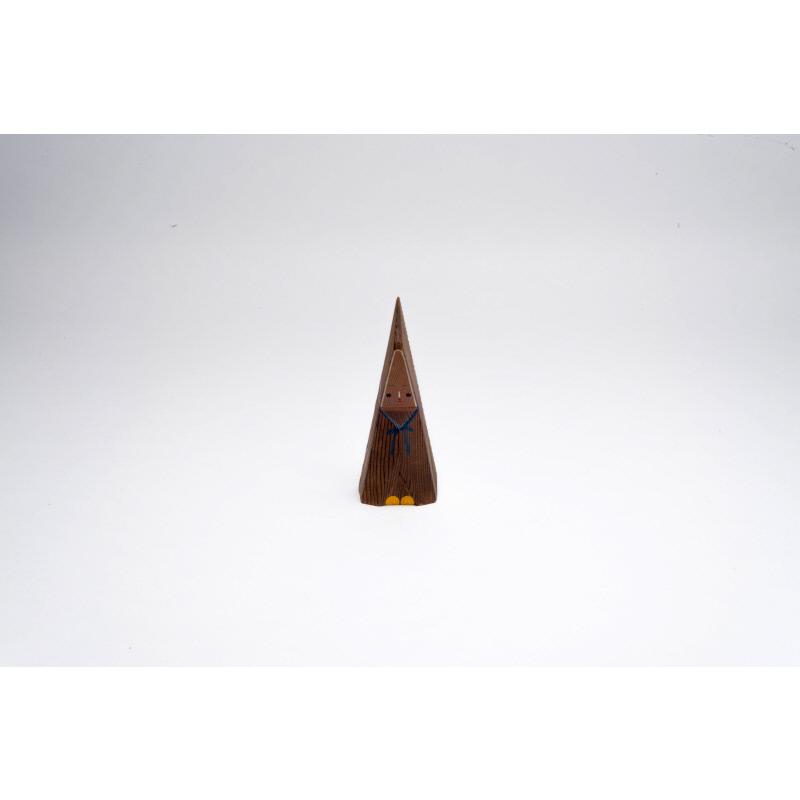Currently indexing
Wooden figure
Classification(s):
Wood
Date: c.1951 - 1976
Dimensions:
185 × 70 mm (18.5 × 7 cm)
Medium: Cedar wood
Object number: W478E
Place of Production:Japan
DescriptionJapanese wooden figure with a triangular head and painted detailing. The figure is dressed for snow, in a hooded coat. The figure has a blue neck ribbon. The wood has been cut and carved, exposing the transverse, radial and tangential growth. A gold manufacturing label with Japanese characters is on the reverse.
There are 2 other similar figures represented in the collection.
An example of Japanese craft. This set of three dolls, hand carved from cedar wood, are from Northern Japan. They are called ‘osugi warabe’ meaning cedar children.
There are 2 other similar figures represented in the collection.
An example of Japanese craft. This set of three dolls, hand carved from cedar wood, are from Northern Japan. They are called ‘osugi warabe’ meaning cedar children.
ProvenanceThis object was originally acquired for the Inner London Education Authority’s (ILEA) ‘Circulating Design Scheme’ collection.
The collection was instigated by the London Country Council (later the Greater London Council) and the Council of Industrial Design (COID). The collection’s original purpose was concerned with the teaching and dissemination of modern, ‘good design’.
The collection was established in 1951/52 as the ‘Experiment in Design Appreciation’, later renamed the ‘Circulating Design Scheme’.
The Circulating Design Scheme lent boxed showcases to London schools. The showcases contained handling objects, material samples and interpretation on a specific subject.
COID withdrew its involvement in the Scheme in 1957. After which time, it was managed exclusively by the London County Council from 1957-1963.
After the administrative restructuring of London authorities, the Scheme was jointly managed by the Greater London Council and the Inner London Education Authority (ILEA) from 1963 – 1976.
The Scheme was operational until 1976 when the collections were withdrawn from circulation. ILEA was abolished in the late 1980s and the collection was donated to Camberwell College of Arts in 1989/90.
ILEA was responsible for secondary and tertiary education in the inner London boroughs, this included Camberwell.
The collection was instigated by the London Country Council (later the Greater London Council) and the Council of Industrial Design (COID). The collection’s original purpose was concerned with the teaching and dissemination of modern, ‘good design’.
The collection was established in 1951/52 as the ‘Experiment in Design Appreciation’, later renamed the ‘Circulating Design Scheme’.
The Circulating Design Scheme lent boxed showcases to London schools. The showcases contained handling objects, material samples and interpretation on a specific subject.
COID withdrew its involvement in the Scheme in 1957. After which time, it was managed exclusively by the London County Council from 1957-1963.
After the administrative restructuring of London authorities, the Scheme was jointly managed by the Greater London Council and the Inner London Education Authority (ILEA) from 1963 – 1976.
The Scheme was operational until 1976 when the collections were withdrawn from circulation. ILEA was abolished in the late 1980s and the collection was donated to Camberwell College of Arts in 1989/90.
ILEA was responsible for secondary and tertiary education in the inner London boroughs, this included Camberwell.





